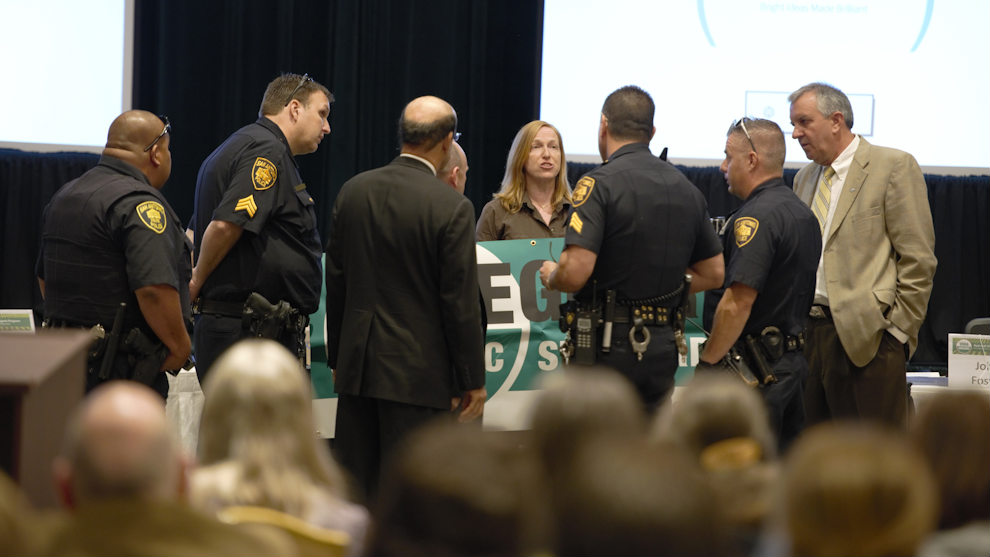
James OvallePolice arrest Alexis Baden-Mayer.
On April 29, a group of protesters walked into a meeting of the National Organic Standards Board in San Antonio, Texas, and began chanting, “Don’t change sunset!” Eventually the police arrived to arrest one of the protesters — Alexis Baden-Mayer, the political director of the Organic Consumers Association. It all occurred at a deliberate, almost ceremonial pace: The protesters repeating their mantra with even precision as the relaxed cops chatted with the equally calm Baden-Meyer, then handcuffed her, and carried her out.
The cryptic chant referred to an obscure bureaucratic rule that the board uses to help it determine what can be called organic and what can’t. We’ll get to the arcane details in a minute. Ultimately, it’s that definition of organic itself that was the source of the discontent that came to a head on Tuesday.
You’ve probably noticed that things have changed in the grocery store as you walk down the aisles. Walmart has cast itself as the new organic champion, fer crissakes! There’s more food labeled organic than ever before, and even that — the label — represents a change. Once upon a time, you had to ask the guy at the farm stand if the green beans were organic; now an emblem anticipates and answers the question. On the minus side, it’s no longer a personal interaction; on the plus, the shift has allowed organic food to spread far beyond the farm stand.
There’s a fierce struggle that’s been going on for years over what organic should represent. When the organic movement started, it represented a rebellion against the agricultural establishment. Now — with the organic sector on track to bring in $35 billion in revenue in 2014, and growing way faster than the non-organic market — the anti-establishment force has become … established. Organic once had a suite of anti-industrial, anti-corporate, anti-capitalistic associations. Now, it has changed the system — and along the way, it picked up some tools from the industrial, corporate, and capitalistic toolsheds.
“The bottom line is that as sales of organics and natural brands soar, and large corporations buy up the smaller, organic and natural brands, those corporations begin to throw around their weight at the USDA. That leads to the degradation of organic standards,” Katherine Paul, associate director of the Organic Consumers Association, wrote in an email.
Zea Sonnabend, who grows food at Fruitilicious Farm while working for California Certified Organic Farmers as an inspector and policy specialist, sees it differently. Sonnabend is a member of the National Organic Standards Board, and she says she is as vigilant as anyone out there against a thinning of organic standards. “I feel, in general, it’s well handled,” she said.
Part of the problem is that most people don’t know what organic means, so the National Organic Standards Board has great power and great responsibility. Here are the actual rules if you are really interested. Or, if you aren’t quite that interested, here’s a summary: Organic starts with an environmental foundation. It’s supposed to foster ecological balance, enhance biodiversity, and adapt to the logic of local conditions. Organic farms can’t use synthetic fertilizers and pesticides, though they can use other fertilizers and pesticides. They can’t use antibiotics (caveat, see the correction below) or GMOs; if you are worried about genetically engineered food you can avoid it entirely by eating organic. And there’s a lot more regulatory oversight of the farmer’s work.
Now, the real question is, does all this add up to a real benefit? There is one meta-analysis that suggests that organic farming doesn’t necessarily produce healthier food, and another that suggests that it does. There’s plenty of science, like this, and this, suggesting organic farming is better for the environment; but then there was also a big analysis of the studies of organic farming in Europe that makes it look like it’s not any better.
I’m not going to be able to provide definitive answers in one brief post, but my gut sense is that organic farming is a true net good. Even when I talk to scientists who have just scoffed at a hypocrisy they see in the organic movement, they’ll often end by saying something along the lines of, “It’s amusing to poke fun at it, but in the long run I bet we find there really is something to organics.”
Perhaps there’d be a clearer difference to organic food if the rules were stricter. But at this point the science on many of the issues that protesters raise is even more foggy. For instance, there are some people who think that carrageenan, a thickening ingredient made from seaweed, shouldn’t be allowed in organic foods because there’s some evidence linking it to cancer and digestive problems. But it isn’t that strong — and if you accept weak evidence, pretty much everything causes cancer. (The authors of this study found that 80 percent of the ingredients in a cookbook were associated with cancer.) And yet you could make the argument that organic food should be utterly free of food-technology agents like carrageenan, anyway.
Which brings us to the bureaucratic details that led to this protest at the National Organic Standards Board, and that chant of “Don’t change sunset.” Last year, the USDA revised the board’s “sunset” rule, making it harder to take things (like carrageenan) off the list of stuff that can be considered organic. The board did this to provide a little more stability for farmers, Sonnabend said: “The No. 1 thing that farmers want are rules that are clear and understandable, that don’t change all the time.”
I also spoke with Kathleen Merrigan, who was seen as a friend to organics when she was deputy director of the USDA. Merrigan, now the executive director of the Sustainability Institute at The George Washington University, sighed when I asked about the struggle. “I wish the first instinct weren’t always to pick up the phone and call the New York Times, and stage a protest.”
It used to be that tactics like that were the only way the organic movement could make its voice heard, she said, but now it has a seat at the table. And every time people read a story about “organic” being coopted, the concept that people like her have worked so hard to establish loses some of its power. “Disagreements can’t always be made into do-or-die rhetoric,” she said. “I just wish the politics of organic food would be as sophisticated as its farming systems.”
But perhaps the organic movement isn’t destined to grow into a polite part of the establishment, working the levers of power with sophistication. Perhaps, deep down, these protests spring from a desire to hold on to a rebellious fringe-movement purity.
As organics have gone mainstream, some of its most vigorous fighters have found their concerns relegated to the sidelines. Don’t expect them to exit quietly.
Corrections: It was the USDA, not the National Organic Standards Board, that changed the “sunset rule.” And it’s not quite true that organic means antibiotic free: Organic apple and pear growers sometimes spray antibiotics – but those will be phased out from organic use by the end of 2014.



